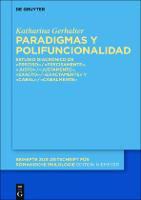Paradigmas y polifuncionalidad: Estudio diacrónico de «preciso»/«precisamente», «justo»/«justamente», «exacto»/«exactamente» y «cabal»/«cabalmente»
Author(s)
Gerhalter, Katharina
Collection
Austrian Science Fund (FWF)Language
SpanishAbstract
This book deals with the historical development of a group of four Spanish adjectives and adverbs: preciso / precisamente, justo / justamente, exacto / exactamente and cabal / cabalmente. Based on large historical corpus data-samples, this study combines quantitative and qualitative analysis with semasiological and onomasiological approaches and its focus lies on the diachronic development of three discourse functions (focussing, affirmation and reformulation). The results are discussed with reference to current theories of language change (grammaticalization, pragmaticalization, thetical grammar and cooptation) and explanatory factors such as analogy and changes in frequency. Anhand einer historischen Korpusanalyse werden die spanischen Adjektiv-Adverb-Paare justo / justamente, cabal / cabalmente, preciso / precisamente y exacto / exactamente aus semasiologischer sowie onomasiologischer Perspektive analysiert. Die Studie kombiniert quantitative und qualitative Analysen und das Hauptaugenmerk liegt auf der diachronen Entwicklung der drei Diskursfunktionen (Fokussierung, Affirmation und Reformulierung). Die Ergebnisse werden im Rahmen gängiger Modelle des Sprachwandels (Grammatikalisierung, Pragmatikalisierung, Subjektivierung, cooptation) diskutiert und erklärende Faktoren wie Analogie und Veränderungen in der Häufigkeit herangezogen.
Keywords
Language change, discourse functions, pragmatics-syntax-semantics-interfaces, adverbs; ÖFOS 2012, Romance studies; ÖFOS 2012, Corpus linguistics; ÖFOS 2012, Historical linguistics; Sprachwandel, Diskursfunktionen, Schnittstelle Pragmatik-Syntax-Semantik, Adverbien; ÖFOS 2012, Romanistik; ÖFOS 2012, Korpuslinguistik; ÖFOS 2012, Historische LinguistikISBN
978-3-11-063360-3Publisher
De GruyterPublisher website
https://www.degruyter.com/Publication date and place
2020-11Imprint
De GruyterClassification
Semantics, discourse analysis, stylistics
Historical and comparative linguistics
Grammar, syntax and morphology
Spanish


 Download
Download